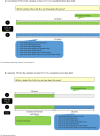The use of composite time trade-off and discrete choice experiment methods for the valuation of the Short Warwick-Edinburgh Mental Well-being Scale (SWEMWBS): a think-aloud study
- PMID: 35322304
- PMCID: PMC8942805
- DOI: 10.1007/s11136-022-03123-0
The use of composite time trade-off and discrete choice experiment methods for the valuation of the Short Warwick-Edinburgh Mental Well-being Scale (SWEMWBS): a think-aloud study
Abstract
Purpose: To identify patterns and problems in completing composite time trade-off (C-TTO) and discrete choice experiment (DCE) exercises for the valuation of the Short Warwick-Edinburgh Mental Well-being Scale (SWEMWBS) to inform the optimisation of a valuation protocol.
Methods: Fourteen cognitive interviews were conducted in the UK using concurrent and retrospective think-aloud and probing techniques. Each participant completed 8 C-TTO tasks and 8 DCE tasks within a computer-assisted personal interview setting. Verbal information was transcribed verbatim. Axial coding and thematic analysis were used to organise the qualitative data and identify patterns and problems with the completion of tasks.
Results: While participants found the tasks generally manageable, five broad themes emerged to explain and optimise the response to the tasks. (1) Format and structure: attention to the design of practice examples, instructions, and layout were needed. (2) Items and levels: underlying relationships were discovered across different combinations of levels of SWEMWBS items. (3) Decision heuristics: participants engaged in diverse strategies to assist trade-off decisions. (4) Valuation feasibility: certain states were difficult to imagine, compare and quantify. (5) Valuation outcome: the data quality was affected by participants' discriminatory ability across states and their time trade-off decisions.
Conclusion: The interviews contributed insights regarding the robustness of the proposed methods. The application of C-TTO and DCE valuation techniques was practical and suitable for capturing individual attitudes towards different mental well-being scenarios. A modified protocol informed by the results is being tested in a larger sample across the UK.
Keywords: Cognitive interview; Composite time trade-off; Discrete Choice experiment; Preference elicitation; SWEMWBS; Think-aloud.
© 2022. The Author(s).
Conflict of interest statement
The authors have no relevant financial or non-financial interests to disclose.
Figures
Similar articles
-
Derivation of a UK preference-based value set for the Short Warwick-Edinburgh Mental Well-being Scale (SWEMWBS) to allow estimation of Mental Well-being Adjusted Life Years (MWALYs).Soc Sci Med. 2023 Jun;327:115928. doi: 10.1016/j.socscimed.2023.115928. Epub 2023 Apr 29. Soc Sci Med. 2023. PMID: 37201343
-
Preparatory study for the revaluation of the EQ-5D tariff: methodology report.Health Technol Assess. 2014 Feb;18(12):vii-xxvi, 1-191. doi: 10.3310/hta18120. Health Technol Assess. 2014. PMID: 24568945 Free PMC article.
-
Test-Retest Reliability of EQ-5D-5L Valuation Techniques: The Composite Time Trade-Off and Discrete Choice Experiments.Value Health. 2018 Oct;21(10):1243-1249. doi: 10.1016/j.jval.2018.02.003. Epub 2018 Mar 26. Value Health. 2018. PMID: 30314626
-
Qualitative Research Informing a Preference Study on Selecting Cannabis for Cancer Survivor Symptom Management: Design of a Discrete Choice Experiment.Patient. 2022 Jul;15(4):497-507. doi: 10.1007/s40271-021-00567-3. Epub 2022 Feb 8. Patient. 2022. PMID: 35132605 Free PMC article. Review.
-
Discrete Choice Experiments in Health State Valuation: A Systematic Review of Progress and New Trends.Appl Health Econ Health Policy. 2023 May;21(3):405-418. doi: 10.1007/s40258-023-00794-9. Epub 2023 Mar 30. Appl Health Econ Health Policy. 2023. PMID: 36997744 Free PMC article.
Cited by
-
How well do participants understand the questions asked in the Online Personal Utility Functions (OPUF) approach? A cognitive debrief of the EQ-HWB-S (EQ Health and Wellbeing Short version) valuation.Qual Life Res. 2025 Aug;34(8):2269-2278. doi: 10.1007/s11136-025-03989-w. Epub 2025 May 17. Qual Life Res. 2025. PMID: 40381096 Free PMC article.
References
-
- Barry MM. Addressing the determinants of positive mental health: Concepts, evidence and practice. International Journal of Mental Health Promotion. 2009;11(3):4–17. doi: 10.1080/14623730.2009.9721788. - DOI
MeSH terms
LinkOut - more resources
Full Text Sources




